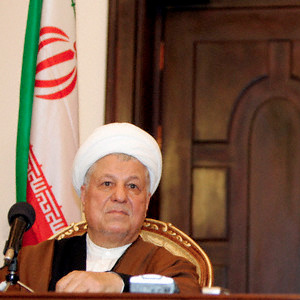Iran Supports the Political process in Iraq
Rafsanjani’s visit to Iraq put emphasis on bilateral ties and Iran’s support for the political process in Iraq. Interview with Mohsen Hakim, political advisor to head of the Iraqi Coalition.

 Rafsanjani’s visit to Iraq put emphasis on bilateral ties and Iran’s support for the political process in Iraq. Interview with Mohsen Hakim, political advisor to head of the Iraqi Coalition.
Rafsanjani’s visit to Iraq put emphasis on bilateral ties and Iran’s support for the political process in Iraq. Interview with Mohsen Hakim, political advisor to head of the Iraqi Coalition.Head of Iran’s Expediency Council, Akbar Hashemi Rafsanjani made a six-day trip to Iraq last week. Iranian Diplomacy has interviewed Mohsen Hakim, political advisor to head of the Iraqi Coalition.
How will Rafsanjani’s visit affect political relations between Iran and Iraq? How can it consolidate Iran’s support for the new Iraqi regime?
Rafsanjani’s and other senior Iranian officials’ visit to Iraq and their meetings with Iraqi political parties, religious leaders etc. can reinforce the political process in the new Iraq. Rafsanjani’s visit, and other similar visits, are considered as remarkable steps made by the Islamic Republic of Iran to bolster its support for the new Iraqi regime.
Taking into consideration Iran’s emphasis that it will help Iraq with reconstruction, what are the economic achievements of Rafsanjani’s visit to Iraq?
Hashemi Rafsanjani has valuable experience of reconstruction since he was Iran’s first post-war president. Iraq can utilize this experience, and obtain advice from all those figures that were effective in reconstructing Iran after its 8-year war with Iraq.
Tehran and Baghdad have made efforts such as signing more than 120 protocols after the fall of Saddam, some of which become actualized. At any rate, Tehran and Baghdad have expanded relations and we hope all our potentials become effective.
Were there any discussions about the common border during Hashemi Rafsanjani’s visit?
As far as I know there weren’t any talks. Border problems are on the agenda of foreign ministries of both countries. A few months ago the Iraqi Deputy Foreign Minister on Legal Affairs and his delegation visited Iran and discussed the problem with their Iranian counterparts. Hashemi discussed key issues in his visit.
Some believe that Rafsanjani’s trip was aimed to actualize the Iranian Supreme Leader’s demand for expulsion of Mojahedin-e-Khalgh terrorist group. Was there any official promise made by Iraq?
This has always been a part of negotiations between Iranian and Iraqi officials. The Iraqi government is working on expelling the terrorist organization and tries to settle the problem as quick as possible.
Since 2003 the Iraqi government has put MKO’s expulsion on its agenda. In addition to being an international commitment, expelling MKO members is a domestic commitment for the Iraqi government. Definitely Mojahedin-e-Khalgh Organization is recognized as a terrorist group by the Iraqi government, the Iraqi constitution and bills passed by the Iraqi parliament. They have to leave Iraq as soon as possible.
What is your overall assessment of Hashemi’s visit?
Undoubtedly, visits made by senior officials of both countries can significantly improve bilateral ties. Iran and Iraq have historical relations. They share a nearly 1336-kilometer long border. Also geopolitically, geostrategically and culturally there are many reasons to cement ties.
After fall of the Baath party, Tehran and Baghdad have made great efforts to rebuild relations. Frequent official visits can be a means to solving existing problems and reinforcing historical relations between the two neighbors.
There are also other important points. In his visit Hashemi Rafsanjani made trips via overland routes and no problem occurred. This is a significant security achievement. As to political achievements, Hashemi’s visit was another evidence for strong ties between the two countries and Iran’s support for the political process in new Iraq. His meetings with religious leaders and political figures also proved how extensive are the relations between Iranians and Iraqis. In general, it was a fruitful visit and we hope to see its effects on bilateral ties as soon as possible.

